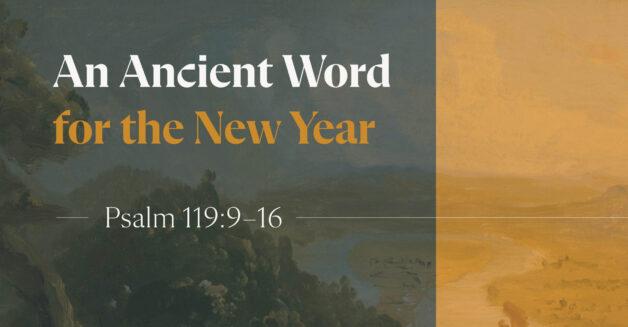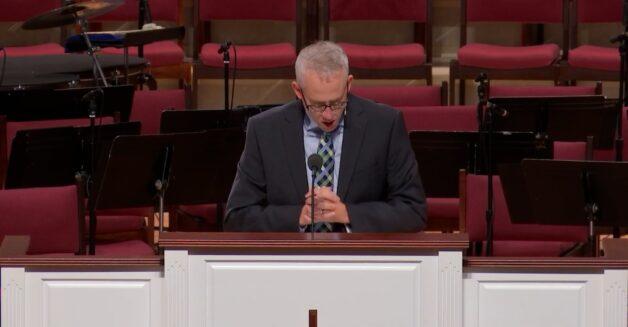Quick: without giving the title of this post too much thought, how would you answer the question? What’s the first thought that comes to your head? The first impression that rises unbidden to the surface of your soul?
There are a number of legitimate dangers that need to be heeded when it comes to the New Calvinism. This could be, for some people, just another fad, just another chasing after the It Thang. The movement could crumble under the weight of self-importance. There is the danger of idolizing our heroes and envying our colleagues. There is the danger of minimizing important doctrines in an effort to promote gospel-centered unity. There is the danger of not being careful enough with our associations–and the opposite danger of taking glee in deciding who is in and who is out.
We have all the problems that any movement has. For starters, no one knows who “we” is. There is no established confession that binds us together, no official spokesperson, no adjudicating assembly. At many times, we still have to figure out how to disagree profitably among ourselves. Some of us need to grow up to be better churchmen and invest in formal denominations and institutions, not just informal networks. We need to be wary of pride. We need to be careful not to be too derivative in our thinking. We need to be anchored not in the passing fancy that is our social media world, but in the old Calvinism of the Reformation, and, more importantly, in the oldest “Calvinism” found in the Bible. We need to be sure our deepest and most sustained energies are poured into that one institution Christ promised to build and against which he promised the gates of hell could not stand.
In other words, almost every critique has some merit; almost every warning should be considered.
But this is what I think of when I think of the New Calvinism: gratitude. That’s my jump-out-of-the-box disposition. Not “yeah, but.” Not suspicion. Not a roll of the eyes. Gratitude. I am thankful to God for what he seems to be doing in our day–immensely thankful.
We had our Sola 13 conference over the weekend. To my great surprise, we had almost 3,000 people in attendance, two-thirds of whom were younger than me. Think about that. Here in Lansing, Michigan–the 109th largest MSA in the country–we have thousands of people gather, mostly young people, to hear 7 hour-long sermons on the solas of the Reformation. I met brothers and sisters from throughout the Midwest, a family from Brazil, and whole bunch of people from Canada (lots of people from Canada). I met Lutherans and Methodists who were happy to find something so meaty in their backyard. I met young people with stacks of old books. I had the privilege of looking out over a crowd of people who would hear from two (almost) lifelong Michiganders, a cancer survivor from Texas, an African-American pastor and former football player from Atlanta, a Korean-American scholar and pastor from Boston, and a preacher from Minneapolis who is old enough to be a parent of most of the attendees. And they sat through long, sometimes dense messages exulting in the grace alone, that comes through faith alone, in Christ alone, based on the Scriptures alone, to the glory of God alone. How can we not give thanks.
I was on a phone call last week with a number of brothers from the T4G and TGC circles. It was a relatively brief call, just for the purpose of catching up and for prayer. But in the course of the hour long conversation each man shared where he was seeing God at work. It was wonderful to hear of gospel advance in the Middle East, in Asia, in Brazil, in our seminaries, in the African American community, in our local communities, and in many other places and in many different ways.
Those of us who are young should learn from our fathers and mothers in the faith. I do not hear from them triumphalism, but neither do I hear cynicism or defeatism. I hear from them tremendous gratitude–gratitude for church plants and a growing burden for missions and a hunger for good theology and a rejection of gimmicks and passion for the supremacy of God in all things. The name doesn’t matter. Call it New Calvinism or Young, Restless, and Reformed, or the Reformed Resurgence or simply Big God Theology. No one I know is looking to trademark a tag or to defend everything and everyone that may be associated with a five-year-old label. The substance is the thing–at least on our best days.
It was a joy to spend the weekend with John Piper for a number of reasons. But let me mention two things that were particularly instructive. One was to see John marvel–repeatedly and wondrously–at what he has witnessed over the last decade or two in the church in North America and increasingly in the church around the world. Thousands of people gathering for expository preaching, Reformed theology, and books by dead guys is not the norm, even though it’s all some young Christians have ever known. I understand that the proof is in the churchly pudding, not in a big blast conference. Of course, blog and book and conference “success” means nothing without lasting faithfulness and fruitfulness in the local church. But this conference in particular was the fruit of many good things happening in local churches and these local churches and pastors celebrating each others’ faithful gospel ministry. From all that I see and the conversations I overhear, pastors and churches are where the best of the good things are happening. When I hear older men say they’ve never known a better time to teach at a seminary or to find church planters or to train men eager for expository preaching, I want to stand up and say “Thank you Lord.”
The second thing I saw was a constant stream of well wishers waiting in line to have their 30 second or 3 minutes with Piper. Did many of them take pictures? Sure. Did some want him to sign a book or a Bible? Yes. Were some of the people waiting in line because they are fan boys, John Piper is their homeboy, and they want to tweet their celebrity photo to all their friends? Perhaps. But after standing next to John for three days, here’s what actually happens over and over and over. People come up in tears just wanting to say thank you. People come up with hand written notes of how God has used his preaching so mightily. People wait around for a long time so they can tell John how a book changed their lives, a sermon saved their marriage, how they will never be the same after listening to his series on Romans. I don’t know if John Piper is a celebrity. I guess it depends on your definition. What I do know is that I saw nothing like teenage girls swooning over the Beatles, nothing like a rockstar or superstar athlete holding court with the adoring throngs. I saw a small man who preaches a big God stand patiently and smile tenderly as person after person thanked him for showing them more of God. It was an affection for the man borne out of the affection his ministry has kindled in them for the truth of the Bible and the glory of God.
We are all strugglers, all sufferers, and all sinners. When it comes to the human heart and human movements–and human churches and human denominations and human tradition and human confessions–there will always be room for warnings, corrections, and repentance. But when God is at work there will also be room for gratitude. And when I think of what God is doing in our day I want my first reaction to be a sense of his overwhelming grace.


